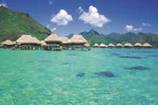

 |
The First International Conference on Quantum, Nano, and Micro Technologies ICQNM 2007 January 2-6, 2007, Guadeloupe, French Caribbean |
| Call for Papers |
Quantum technologies and nano technologies have a great potential to transform communications telecommunications infrastructure and communication protocols, and computers and networking devices. Nanotechnologies and micro-technologies already made their mark on smart materials, nano-medicine, nano-devices, molecular manufacturing, biotechnology, metrology, airspace.
The advancements in material science and computer science have allowed the building, launching and deploying of space exploration systems that continually do more and more as they become smaller and lighter. As an example, carbon nano-tubes have been created that are 250 times stronger than steel, 10 times lighter, and transparent. Similar advances are occurring in glass, plastics and concrete. Spacecraft are being launched, with hulls that are composed of carbon fibers, a light weight high strength material.
Swarms is another concept of nano-robotics; swarms act in unison like bees. They theoretically will act as a flexible cloth like material, as strong as diamond. Interplanetary exploration can be foreseen as being carried on by nano-robots as well.
Electronic devices, medicine, environment, metrology, aerospace programs, clothes and materials, telecommunications, cryptography, semiconductors, manufacturing, and other domains are impacted by the progress on the areas mentioned above. Particularly, micro imaging, nanomedicine: (drug delivery; nanoparticles ie viruses; proteins.), bio-nanostructures: (nano-tubes, nano-particles), microsystems, micro fluidics: (including nano-fludics, modeling; fabrication and application), micro instrumentation / implantable microdevices (miniaturized bio-electronic systems etc.) and micro sensors benefits from the progress on quatum, nano and micro technologies.
The International Conference on Quantum-, Nano- and Micro-technologies (ICQNM 2007) initiates a series of events covering particularly promising theories and technologies. The conference covers fundamentals on designing, implementing, testing, validating and maintaining various kinds of materials, systems, techniques and mechanisms related to quantum-, nano- and micro-technologies.
The conference has the following tracks:
Track 1: Quantum technologies
Track 2: Nano technologies
Track 3: Micro technologies
Track 4: Application domains
We welcome technical papers presenting research and practical results, position papers addressing the pros and cons of specific proposals, such as those being discussed in the standard fora or in industry consortia, survey papers addressing the key problems and solutions on any of the above topics short papers on work in progress, and panel proposals.
The topics suggested by the conference can be discussed in term of concepts, state of the art, standards, implementations, running experiments and applications. Authors are invited to submit complete unpublished papers, which are not under review in any other conference or journal in the following, but not limited topic areas. Industrial presentations are not subject to these constraints. Tutorials on specific related topics and panels on challenging areas are encouraged.
The following track topics are expected to be covered:
Track 1: Quantum technologies
Quantum information
Quantum communication
Quantum computation
Quantum teleportation
Quantum cryptography
Quantum key distribution
Quantum communication infrastructure
Quantum entanglement
Quantum simulation tools
Track 2: Nano technologies
Nano electronics
Nano materials
Nano devices
Nano tools
Nano manufacturing
Integrated nano systems
Testing nano systems
Entanglement and coherence in nano electronics
Standards
Track 3: Micro technologies
Micro design
Micro devices
Integration of micro systems
Micro-nano-electronics and control systems
MEMS/NEMS based micro-instruments
Fuel Cells and Energy Storage Devices
Micro/Nano fluidic devices
Biomolecular machines
Micro propulsion systems
Track 4: Application domains
Nanomedicine: (drug delivery; nanoparticles ie viruses; proteins.)
Bio-nanostructures: (nano-tubes, nano-particles)
Microsystems, micro fluidics: (including nano-fludics, modeling; fabrication and application)
Micro instrumentation / implantable micro-devices (miniaturized bio-electronic systems etc.)
Micro imaging
Nano measurements (optical interference)
Nano biotechnology
Aerospace and automotive
Molecular manufacturing
Nanotech networking event
Quantum Nano metrology
Defense and homeland security
Energy
Aerospace applications
Self-healing materials
Defense applications
Safety
Environmental
Education & training
INSTRUCTION FOR THE AUTHORS
The ICQNM 2007 Proceedings will be published by IEEE Computer Society Conference Publishing Services and on-line via IEEE XPlore Digital Library. IEEE will index the papers with major indexes.
Important deadlines:
| Full paper submission | |
| Author notification | |
| Registration and Camera ready |
Best paper awards will be granted by the IARIA award selection committee.
Only .pdf or .doc files will be accepted for paper submission. All received papers will be acknowledged via the EDAS system.
Final author manuscripts will be 8.5" x 11" (two columns IEEE format), not exceeding 6 pages; max 4 extra pages allowed at additional cost. The formatting instructions can be found on the Instructions page.
Once you receive the notification of paper acceptance, you will be provided by the IEEE CS Press an online author kit with all the steps an author needs to follow to submit the final version. The author kits URL will be included in the letter of acceptance.
Technical marketing/business/positioning presentations
The conference initiates a series of business, technical marketing, and positioning presentations on the same topics. Speakers must submit a 10-12 slide deck presentations with substantial notes accompanying the slides, in the .ppt format (.pdf-ed). The slide deck will be published in the conference’s CD collection, together with the regular papers. Please send your presentations to petre@iaria.org.
Tutorials
Tutorials provide overviews of current high interest topics. Proposals can be for half or full day tutorials. Please send your proposals to petre@iaria.org
Panel proposals:
The organizers encourage scientists and industry leaders to organize dedicated panels dealing with controversial and challenging topics and paradigms. Panel moderators are asked to identify their guests and manage that their appropriate talk supports timely reach our deadlines. Moderators must specifically submit an official proposal, indicating their background, panelist names, their affiliation, the topic of the panel, as well as short biographies.
For more information, petre@iaria.org